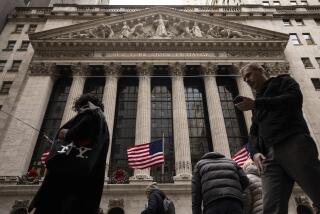Consumer Confidence Rises
- Share via
A widely watched indicator of consumer confidence unexpectedly rose for the second straight month in January, hinting that the U.S. economy would continue to grow in the first half of 2005, but at a slower pace.
The Conference Board, a New York-based research group, reported Tuesday that its index of consumer confidence rose 0.7 point to 103.4 in January, up from a revised 102.7 in December.
Economists had been expecting the index to fall to 101.3, in part because of their own concerns about job growth, the ballooning trade deficit and the war in Iraq.
“I had been expecting those issues to flow into the January [consumer confidence] number,” BMO Nesbitt Burns senior economist David Watt said.
Instead, Watt and other economists were pleasantly surprised by consumers’ upbeat view of the economy, particularly the labor market.
Lynn Franco, director of the Conference Board’s research unit, said, “Consumers’ short-term outlook remains favorable and suggests the economy will continue to expand throughout the first half of the year.”
That said, the group’s forward-looking index declined in January, signaling a slowdown in economic growth. The so-called expectations index fell from 100.7 to 98.4.
“For many economists, that’s probably the most important part of this report,” said Anthony Chan, senior economist at J.P. Morgan Fleming Asset Management in Columbus, Ohio. Chan said he anticipated the U.S. economy would grow at a rate of 3.5% in 2005, down from an estimated 4% in 2004.
Chan and other economists said consumer trepidation about the future was probably tied to the nation’s high level of household debt and expectations of gradually rising interest rates.
Separately on Tuesday, the National Assn. of Realtors reported that sales of previously owned homes slipped 3.3% in December to a seasonally adjusted annual rate of 6.69 million units, off slightly from November’s strong pace of 6.92 million units.
For all of 2004, sales rose 9.4% to an all-time high of 6.68 million units as home buyers continued to enjoy some of the lowest mortgage rates in decades.
The number of existing homes sold last year was well above the 6.1 million in 2003, the association said.
But analysts expect sales of existing and new homes to decline slightly in 2005 while mortgage rates rise as the Federal Reserve continues its credit- tightening campaign to tame inflation.
More to Read
Inside the business of entertainment
The Wide Shot brings you news, analysis and insights on everything from streaming wars to production — and what it all means for the future.
You may occasionally receive promotional content from the Los Angeles Times.










